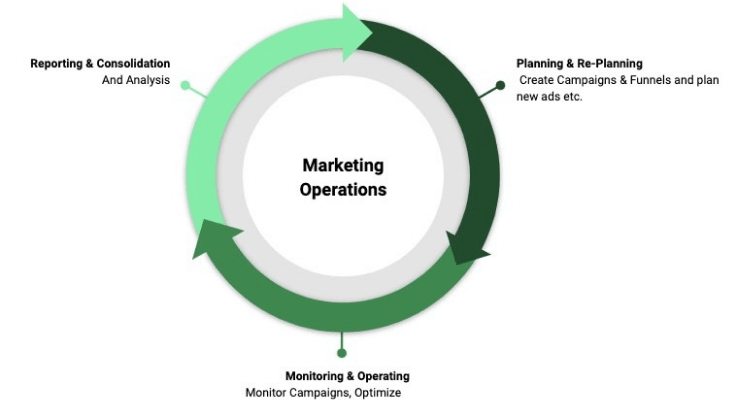Are you looking for a marketing agency to run your digital ads?
We prepared this list of important topics to consider when hiring a marketing agency to run your digital advertising. We believe these are the most important questions your potential new agency should consider and be able to answer. This list was crafted based on many experiences with our customers and related agencies and does represent the most important insights from these learnings.

1. Channels and digital ads diversification
Make sure your marketing activities are appropriately diversified across channels, including social media, digital & offline channels, and owned content, whenever possible (i.e. Facebook, Google, LinkedIn, Twitter, etc.). Many marketing agencies specialize in particular types of digital ads or channels or in the content-creation process.

Therefore, it is reasonable to ensure you and your agency meet the assumed goals across all available channels rather than focusing on one particular channel. Be sure you do not overperform in one type of digital ad but try to reach a certain level of performance diversity. If social media was your best channel in 2019, that doesn’t automatically mean it will still be your best one in 2020. Flexible marketing agencies can cover many channels or partner with other entities to make sure you continue to explore potentials.
2. Campaign naming standardization
It is good practice to elaborate on the naming system of your campaigns with your marketing agency. That allows you to easily identify campaigns that share similar characteristics, goals or metadata.

It might also be beneficial to track similar campaigns that occurred in the past and have valuable performance information about future campaigns of the same origin. During our projects, we have noticed that working with standardized names and data allows us to optimize campaigns more efficiently, especially by understanding the complexity of a multi-campaign environment quicker and more clearly. Discuss such aspects with your marketing agency and work together on a naming convention that will be meaningful and transparent.
3. Smart budget planning
Every marketer knows that wisely building a budget is a crucial step before starting a campaign. We do not want to reinvent the wheel here, but we would like to emphasise how important it is to think this through with your marketing agency, ideally by leveraging data-driven insights. Organize your time together and discuss how efficient the budget was in the past for similar campaigns.

Try to benefit from seasonal time effects (Was your performance higher in a certain month? Maybe weekends do not give you so many impressions or conversions?). Look into when you had an unnecessary surplus of money or when you ran out of it. By analyzing the past and therefore having a good understanding of budget-spend trends, you can react quickly and invest your money at the right moment. Be ready for unexpected spendings. When you notice certain digital ads are working very efficiently, try to boost them with your budget, as such behavior might be short-term and dynamically reverse.
4. Top-notch algorithm usage
Thanks to the latest development in artificial intelligence, you can facilitate a huge spectrum of your marketing activities by using data-driven approaches.

For this reason, be sure the marketing agency you work with has the needed analytical capabilities, including the team composure (Do they work with the analytics partner/platform such as nexoya or have data scientists or machine learning engineers in-house?), and the know-how (Which marketing use cases do they solve with predictive modelling?). With current dynamics in the AI field, not using it equals being behind your competitors. Therefore, make sure either you or your marketing agency can gain from the latest AI improvements.
5. Your tools access
Having worked with clients who manage their campaigns through agencies, we have noticed that, from time to time, there is a discrepancy between what is expected to be run via various channels and within the respective tooling by clients and types of assets managed by the marketing agency. And do not get us wrong, we do not assume any maliciousness here.
We have observed that some channels are misused by not fulfilling their potential (therefore generating higher cost than needed) and some are preferred due to the practice and knowledge of the agency. In such cases, we would suggest discussing the purpose of certain channels with your marketing agency and obtaining at least read-only access to the respective tools of the channels to ensure full transparency of their usage. It also makes sense to ensure you get the full data after a campaign is finished so that you remain independent from the respective agencies and have full ownership of your data.
6. Performance vs. price
When setting up a campaign, you need to decide what you would like to optimize and what you will get as a return for your budget spend. On one hand, you might spend a certain portion of the budget on a particular digital ad and then measure its performance (e.g., impressions or clicks). On the other hand, you may pay a fixed amount of money and receive a guaranteed number of impressions or clicks (quite often for premium publishers).
Be sure to discuss such topics in detail with your marketing agency. Both strategies make sense in different scenarios; it might be relevant to have both of them applied. Quite often you can save money by smartly applying one strategy or the other for certain types of digital ads or by testing and exploring each channel more wisely.
7. Frequent meetings and discussions
We believe that running a marketing campaign is a dynamic state. You always need to anticipate what will happen in the near future and respond wisely and actively to certain marketing scenarios. Such tasks might become complex if some of your activities are managed by an external marketing agency. If you control the budget and the agency performs marketing operations, be sure your cooperation is smooth and effective and without any unnecessary organizational burdens.
Try to have frequent alignments capturing short- and mid-term goals, discuss your ROI/ROAS and set up meetings and status updates frequently enough to be sure you can react to changes observed by you or your marketing agency.

We hope these tips will help you find the agency that best fits your next marketing campaign!
Can’t wait to become more data-driven? Read more about Applications of AI in Email Marketing and The benefits of Predictive Analytics in Marketing!